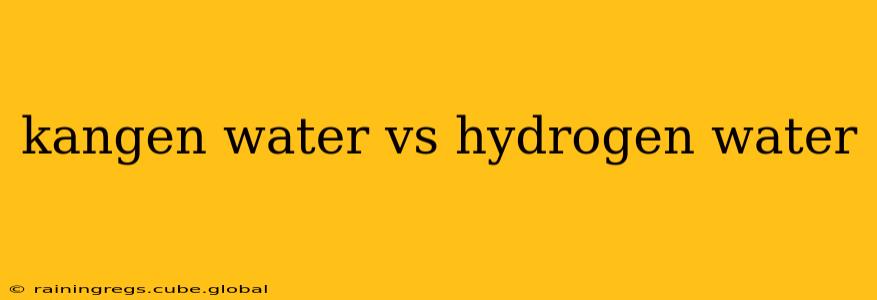The health and wellness world is abuzz with discussions about alkaline water, and two prominent contenders often emerge: Kangen water and hydrogen water. While both are touted for their potential health benefits, understanding their differences is crucial for making informed choices. This comprehensive guide delves into the nuances of each, comparing their production methods, claimed benefits, and potential drawbacks.
What is Kangen Water?
Kangen water, originating from the Japanese word for "return to origin," is alkaline water produced using a specific type of electrolysis machine, often called a Kangen water machine. These machines use electrolysis to separate water into its constituent parts, resulting in water with a higher pH level (alkaline) and a purportedly higher concentration of antioxidants. The process involves passing water through several plates with different electrical charges, separating the water into acidic and alkaline fractions. Kangen water machines typically produce several types of water with varying pH levels, each designed for different purposes (drinking, cooking, cleaning).
What is Hydrogen Water?
Hydrogen water, also known as hydrogen-rich water, is water infused with molecular hydrogen (H2). Unlike Kangen water, which focuses on alkalinity and antioxidant properties produced through electrolysis, hydrogen water emphasizes the direct addition of hydrogen gas to the water. This can be achieved through various methods, including bubbling hydrogen gas directly into the water, using specialized hydrogen-generating water bottles, or consuming hydrogen tablets which release hydrogen gas when added to water. The focus here is on the purported health benefits attributed to the dissolved hydrogen gas itself, rather than the overall alkalinity of the water.
How are they different?
The primary difference lies in the method of production and the claimed mechanisms of action. Kangen water focuses on electrolysis to create alkaline water with a higher ORP (oxidation-reduction potential) indicating a higher antioxidant capacity. Hydrogen water, conversely, focuses on infusing the water with molecular hydrogen, regardless of the water's pH. While Kangen water often has a higher pH, it's not necessarily the elevated pH that's the key component of its purported benefits; it's the changes in ORP and the claimed production of other potential beneficial components through electrolysis. Hydrogen water may or may not be alkaline, depending on the source water and the method of hydrogen infusion.
What are the Claimed Benefits of Kangen Water?
Proponents of Kangen water claim several health benefits, including:
- Improved hydration: The proponents suggest its smaller molecular cluster size allows for better absorption.
- Antioxidant effects: Due to the electrolysis process, it’s claimed to contain higher levels of antioxidants.
- Alkalinizing effects: It can help neutralize acidity in the body.
- Improved cellular function: It's suggested to assist in optimal cellular performance.
It's crucial to note that scientific evidence supporting these claims for Kangen water specifically is limited and often inconclusive. More research is needed to verify these benefits.
What are the Claimed Benefits of Hydrogen Water?
Hydrogen water also boasts a range of claimed benefits, including:
- Antioxidant and anti-inflammatory effects: Molecular hydrogen is believed to selectively target harmful free radicals.
- Improved mitochondrial function: Hydrogen may enhance energy production at a cellular level.
- Neuroprotective effects: Some studies suggest potential benefits for neurological conditions.
While research on hydrogen water shows some promise, it's important to remember that more large-scale, high-quality studies are needed to confirm these benefits across diverse populations. The results so far have been mixed and more robust clinical trials are required.
Is Kangen Water the Same as Alkaline Water?
While Kangen water is a type of alkaline water, not all alkaline water is Kangen water. Many other methods can produce alkaline water, and the specific properties (mineral content, pH, ORP) can vary significantly. The unique aspect of Kangen water is its method of production using a specific type of electrolysis machine.
What are the Potential Drawbacks?
Both Kangen water and hydrogen water have potential drawbacks:
- Lack of conclusive scientific evidence: Many claimed benefits haven't been rigorously validated through large-scale human trials.
- Cost: Specialized machines or hydrogen-infusing products can be expensive.
- Potential for mineral imbalance: Excessive consumption of highly alkaline water might disrupt mineral balance in some individuals.
- Potential interactions with medications: Consult your physician before making significant changes to your water intake, particularly if you are taking medication.
Conclusion:
Kangen water and hydrogen water are both interesting areas of research in the field of alternative health and wellness. While both show potential benefits, it's critical to approach claims with a healthy dose of skepticism until more robust scientific evidence emerges. Consult with your healthcare provider before making significant dietary or lifestyle changes, including altering your water intake. Always choose reputable sources for your information and prioritize well-designed studies over anecdotal evidence.
